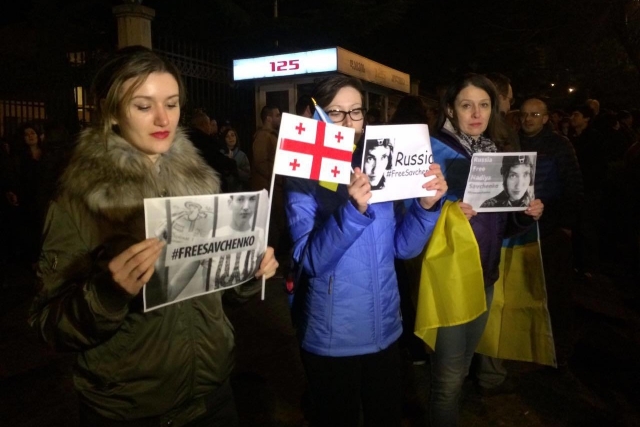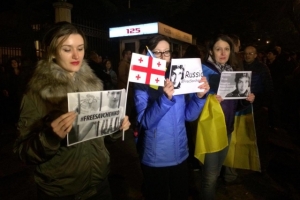Hundreds of Georgians Rally to Support Ukrainian POW
TBILISI - A rally in support of Ukrainian prisoner Nadya Savchenko, illegally held by Russia for nearly 600 days, was held in Georgia’s capital Tbilisi on 9 March.
At midnight on Tuesday, hundreds of people gathered in front of the Ukrainian and Russian section of Swiss Embassies in Tbilisi, demanding the release of the former military pilot, who faces 25 years in a Russian prison.
Protesters lit sky lanterns with images of Savchenko’s face and projected various anti-Russian slogans on the facade of a building that once housed Moscow’s embassy in Tbilisi.
"Nadya Savchenko is a symbol of freedom. No matter how this fight will end, she will be the winner. We on the outside should do everything possible to save her life. She is an amazing woman,” said Women’s Movement representative Baia Pataraia.
The rally was part of a global protest in support of Savchenko, who was illegally moved to Russia after being captured in east Ukraine.
In Russia, at least 35 people, mostly women, were detained across for taking part in rallies in support of Savchenko.
Savchenko was a volunteer in Ukraine’s Aidar Battallion, fighting in the country’s east against the Russian armed forces and their local rebel proxies.
She was captured by rebel units near a small village in the war torn Lugansk Region on 22 June 2014, after being surrounded and cut off by Russian-backed troops.
After reportedly being subjected to torture and harsh interrogation methods, she was illegally transferred across the border to a Russian military prison in Voronezh and later accused of directing artillery fire that killed two Russian freelance journalists.
Russian authorities formally charged Savchenko with murder and an illegal violation of the border.
Her defense counsel, former Pussy Riot lawyer Mark Feygin, claims Savchenko was intentionally targeted by Russia’s FSB intelligence services for political reasons and is being held, not as a legal combatant, but as a political prisoner.
According to the GPS positioning and mobile phones carried by both Savchenko and the rebels units who captured her, Savchenko was captured one hour prior to the death of the two Russian journalists and in a location far from the site of their deaths.
Russia’s Kremlin-controlled media has since repeatedly used sexist epithets when discussing Savchenko, calling her ‘a killing machine in a skirt’. They have gone as far as to deem the tangible evidence pointing to the whereabouts of Savchenko and the rebels units who captured her, Western propaganda.
Contradicting the claim that she was taken prisoner in combat by rebel forces, the prosecutor in charge of the case says Savchenko voluntarily and illegally crossed the border into Russia without her passport or proper documentation and was summarily detained as an illegal alien.
Since her arrest, Savchenko won a seat as a parliamentarian in Ukraine’s Verkhovna Rada and became a member of the Council of Europe’s Parliamentary Assembly.
Russia has refused to recognize her legal right to diplomatic immunity as a sitting member of government, saying the events she is charged with predate her status as a parliamentarian.
Western governments and the UN have called for her immediate release, saying her detention is politically motivated. Moscow, however, has angrily responded to the pleas, stating international pressure regarding the case amounts to illegal interference in the Russian criminal justice system.
Savchenko began a hunger strike on 4 March after the Russian court barred her from making a closing speech during her final day in court.
Her lawyers immediately announced a global day of support on 9 March, the day when her sentence will be announced.
Edited by Chloe Diamond
Photo: Giorgi Diasamidze/Netgazeti












